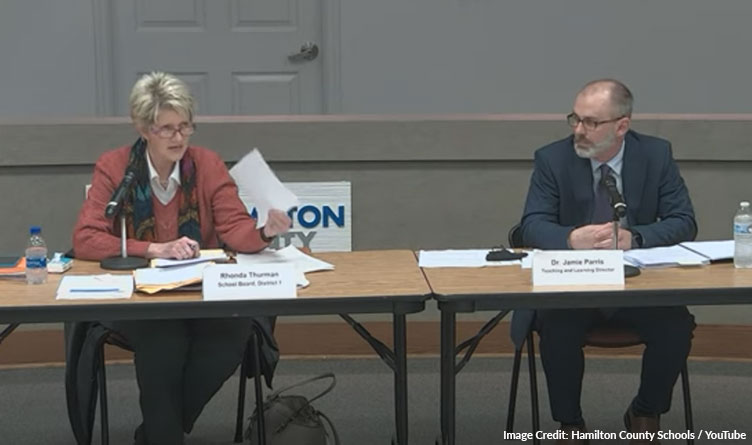Image Credit: Hamilton County Schools / YouTube
The Tennessee Conservative Staff –
The Hamilton County School Board’s Book Review Committee met on Tuesday to discuss the procedure that is currently in place for determining what books are found in school libraries.
School board member Rhonda Thurman chaired the committee which was made up of two appointed representatives from each of the districts. Their goal was to look at the current approval policy for books and decide if changes need to be made to that policy.
The two-hour meeting became heated at times as committee members disagreed on exactly what should be done regarding complaints of “obscene” books in some Hamilton County Schools libraries. Complaints have been made regarding a number of books that included controversial material such as profanity, sexual activity, drug use, and violence.
“I think we’re just about where the rest of the nation is,” said Thurman. “I think parents are just now waking up to some of the literature that is being made available to their students.”
The topic is already being considered in the Tennessee Legislature, but Thurman feels they should be proactive.
“If some of the laws in the legislature pass, some of the books will have to come off the shelf,” Thurman said. “I want to prevent that from happening, they shouldn’t be there to begin with.”
*** Click Here to Support Conservative Journalism in Tennessee. We can’t cover stories like this without your support! ***
Some committee members were ready to offer suggestions for updating school board procedures to help keep some of those books from making it into the schools. Suggestions were made for updating the policy itself to include more specific wording or to create a procedure where parents can opt their children in to allow them to check out materials that may be considered inappropriate.
But other members felt that nothing needed to change.
“The materials that have been shared are definitely taken without context,” said Angela Favaloro, a parent on the committee. “If we applied all of the rules that were stated tonight, I’m not sure we’d have much left other than reference.”
Another parent on the committee, Autumn Witt Boyd, said, “Other parents have different values that they’re wanting to raise their kids with. So, it involves a lot of passion. The more we dig into it, we see there’s layer upon layer upon layer. We can’t have clear-cut rules, there are too many books.”
Committee member David Kelman, a teacher at East Hamilton County High School, questioned the level of documentation that was kept by librarians and administrators in regards to what criteria was used to determine the appropriateness of selected books.
“I think multiple people have said that the policy on the face of it strikes a lot of the right tones but then we’re not all happy with how that’s being implemented. Some people are, some people aren’t, so I will just make one more plea to documentation to save misunderstandings after the fact,” Kelman said. “The more we can put transparency on the process, accommodate all the different facets of our community, the sounder footing our school system will be on.”
The committee is scheduled to meet again on March 8 for further discussion in hopes of finalizing a policy that will be submitted to the school board for review.





2 Responses
Transparency is not the solution. Moral judgement is. Age appropriateness is. If parents insist that their children need books that are not moral or age appropriate, there are book stores where these books are probably available. But don’t require the state or locality to fund them not make them available.
Transparency is not THE solution, but I believe it is a necessary precondition of and component within a solution. I agree wholeheartedly that judgements about age appropriateness must figure prominently in selection of materials. The good news is that existing policy seems to agree. The bad news is that a number of people do not trust that existing policy is being followed properly in all cases. We have some evidence that seems to make a fair argument supporting that worry and too little evidence to refute it.
I think the policies need a few other mostly-minor tweaks to close loopholes during future selection of materials and build some more trust in the monitoring and reconsideration processes. My recommendations will be only one voice, however, and I cannot forecast either exactly what comes out of the final meeting or what our full elected board will choose to do with any of it.